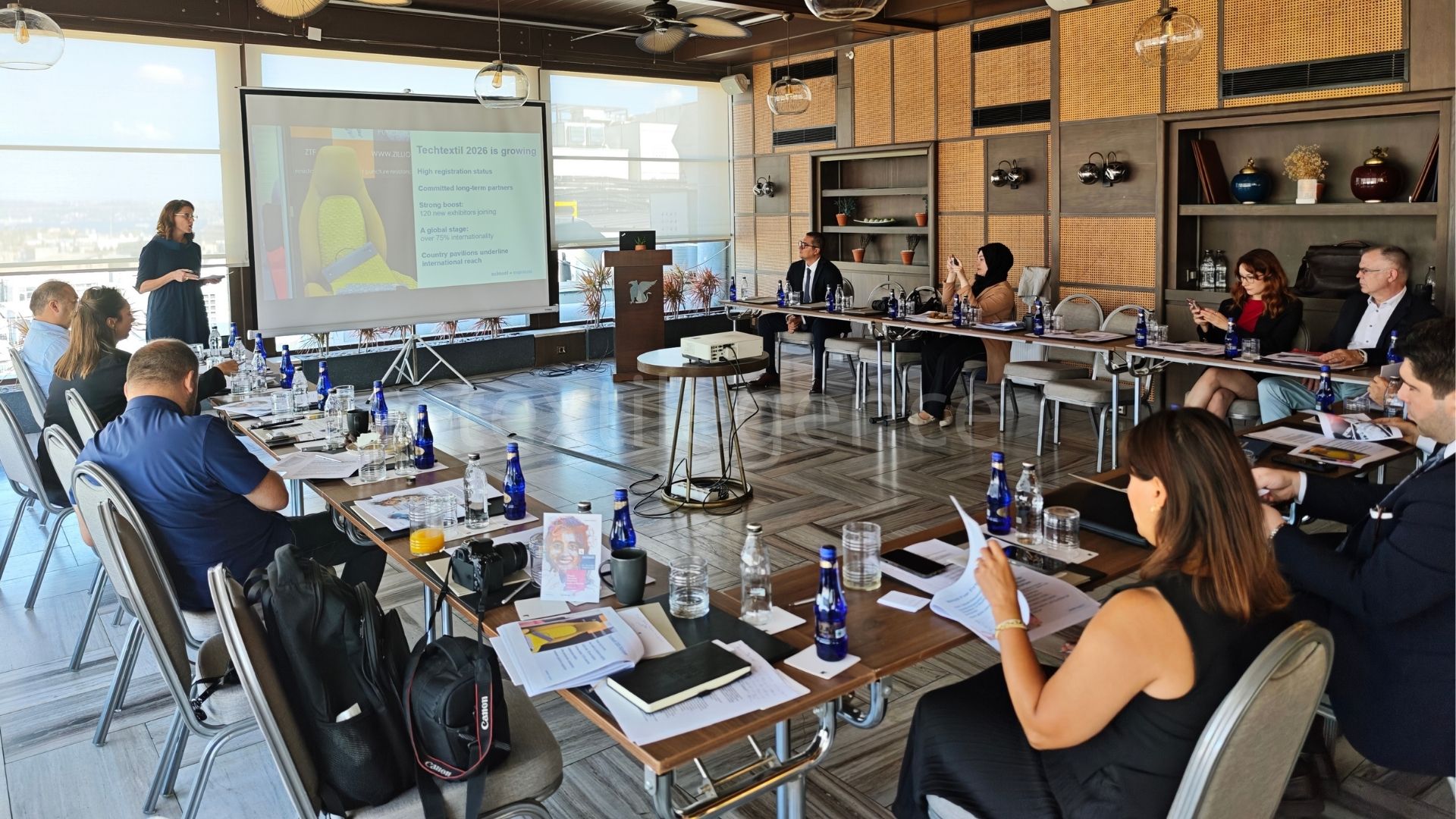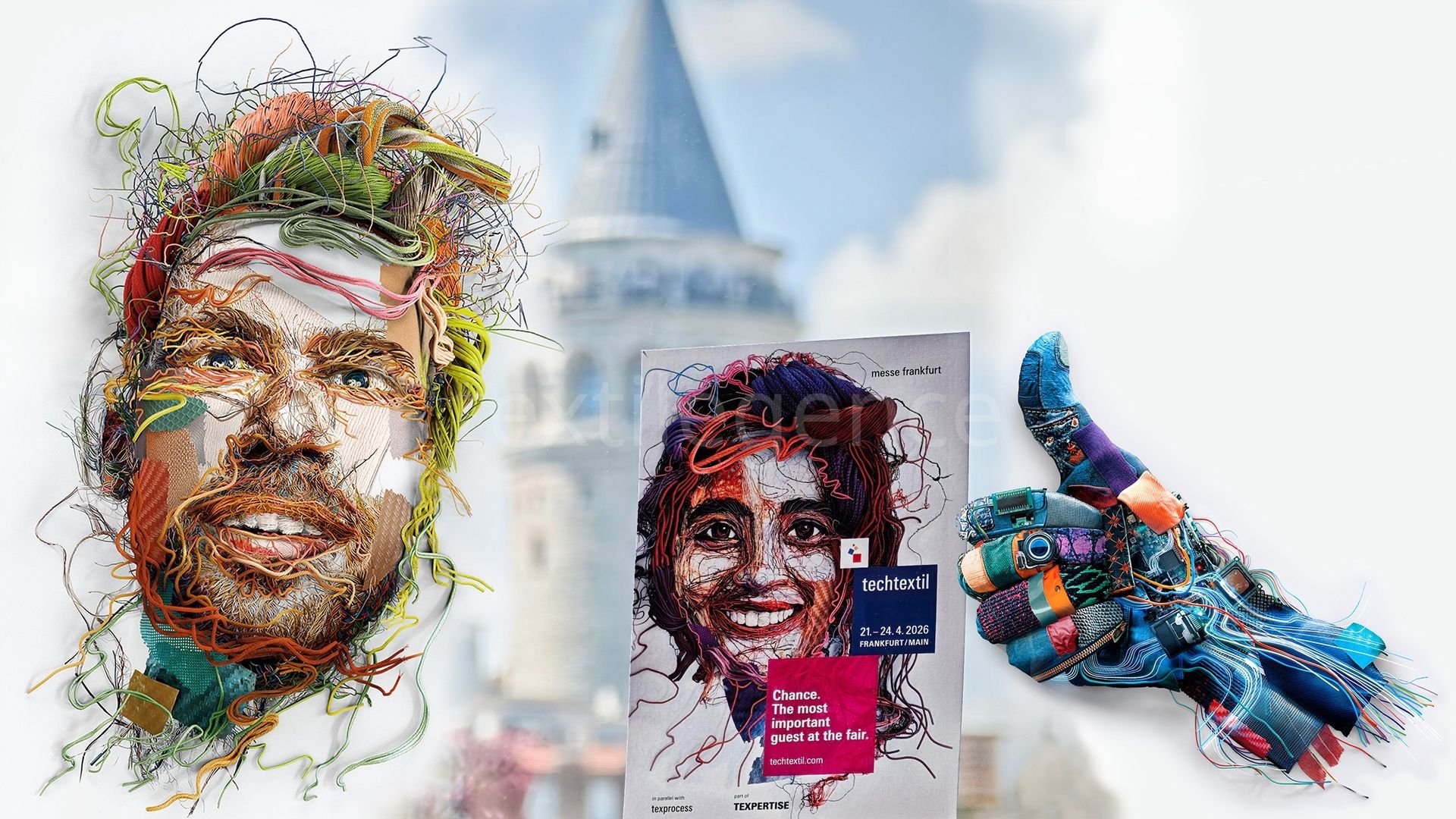The Techtextil trade fair for technical textiles and Texprocess for textile and flexible materials processing will take place simultaneously and in an integrated format from 21-24 April 2026 at Messe Frankfurt. Aimed at becoming platforms for growth in exhibitor and visitor numbers and for introducing innovative products, the fairs were introduced at a press conference in Istanbul attended by Sabine Scharrer, Trade Fair Director of Techtextil and Texprocess; Elgar Straub, Managing Director of VDMA and TFL; Murat Şahinler, Board Member of İTHİB; and M. Can Yümer, Sales and Marketing Director of Messe Frankfurt Istanbul.
Saying Messe Frankfurt’s Texpertise network as a global meeting point for the textile industry, Sabine Scharrer stated that over 60 textile fairs are organized across 13 countries. She emphasized that Türkiye is among the largest countries in terms of both visitors and exhibitors at Techtextil and Texprocess. Scharrer said: “The Turkish textile industry must invest more in new processes and technologies to meet the necessary standards. While this may increase product costs, it will also bring new market advantages.”
Reminding that visitors can attend both Techtextil and Texprocess with a single ticket, Scharrer noted that the textile value chain from fiber to finished product can be observed, and maximum business potential is achieved through high cross-visit rates. She added that exhibitors from over 100 countries will present their innovative products, sharing further details: “Techtextil is transforming the industry with innovations across 12 application areas. Performance Apparel Textiles will be showcased comprehensively this year in Hall 9.0. Functional materials, fabrics, yarns, and fibers provide maximum safety in aviation and firefighting apparel while enabling smart breathability and moisture management in modern sportswear. Demand for natural materials is increasing in the automotive and construction sectors, with solutions presented in the Nauter Performance area in Hall 9.1. This year, textile chemicals and dyes have also been included in the product portfolio for the first time and positioned close to the Performance Textiles, Fibers, and Yarns section.”
Regarding Texprocess, Scharrer reported that 30 new exhibitors had registered as of September, stating that the fair will serve as a global meeting point with more than 200 participants and visitors from 24 countries. She added: “Texprocess is important not only for its number of exhibitors and visitors but also for bringing decision-makers together, shaping the industry. Seventy-six percent of exhibitors hold influential positions in purchasing decisions. Techtextil and Texprocess will be events where investment decisions clarify the overall market outlook.”

Egypt leads Turkish sewing and garment technology exports
Addressing current developments in the European textile finishing, fabrics, and technologies industry, Elgar Straub noted that compared to July of the previous year, order intake increased by 28.2%, while sales rose by 0.6%. He added: “On a quarterly basis covering April–June 2025 and compared to the previous year, order intake increased by 44%, while sales decreased by 5%, covering all sewing and apparel technologies as well as laundry and cleaning technologies.”
Straub stated that according to VDMA data for 2024, Germany remains the leading supplier in the global market for apparel technologies despite a decline, with German manufacturers still strong in exports. He listed the most important export markets during this period as Poland, France, Italy, the USA, India, and China, sharing data on Türkiye: “In 2024, Egypt became the most important market for Turkish sewing and apparel technology exports with a significant leap, followed by Uzbekistan, India, Azerbaijan, Russia, and Bulgaria. Despite a major decline, China remained Türkiye’s main supplier of sewing and apparel technologies last year, followed by Italy, Germany, Japan, Taiwan, and Switzerland.”
Elgar Straub also addressed current challenges in apparel and technical textile production under the headings ‘Sustainability’ and ‘Consumer Behavior and Fast Fashion.’ He noted that the industry is under strong pressure to adopt more environmentally friendly production methods, including reducing CO2 emissions, using sustainable materials, and decreasing water consumption. He stressed that manufacturers today need to be flexible and innovative, rapidly responding to changing consumer trends. He further mentioned that disruptions caused by geopolitical uncertainty, trade wars, and labor shortages are creating challenges and complexities in production, emphasizing the importance of compliance with new regulations.
Opportunities for the Turkish textile industry in new markets
Murat Şahinler, Board Member of İTHİB, presented an overview of the Turkish textile industry. Under the theme ‘Opportunities for Expansion into New Markets,’ Şahinler noted that global demand is contracting, price competition is increasing, and costs are rising. He said: “The Turkish textile industry is the world’s 5th largest exporter and the EU’s 2nd largest supplier, undergoing a significant transformation. Our task is to maintain our share in existing markets while creating lasting success stories in new markets. As the Turkish textile sector, we achieve 12 billion dollars in annual exports. The total production volume of the textile and apparel industries is 78 billion dollars, with 45 billion dollars coming from textile production, making us the largest producer in the region. Approximately 34 billion dollars comes from apparel production. Our integrated production strength is the key factor that will lead the Turkish textile industry to success.”
Şahinler stated that the key to overcoming global crises lies in alternative markets and product diversity, highlighting the importance of technical textiles: “The Turkish textile industry will be a global player not only today but also in the future. We believe that the collaboration between Techtextil and Texprocess will open new doors for our industry.”

